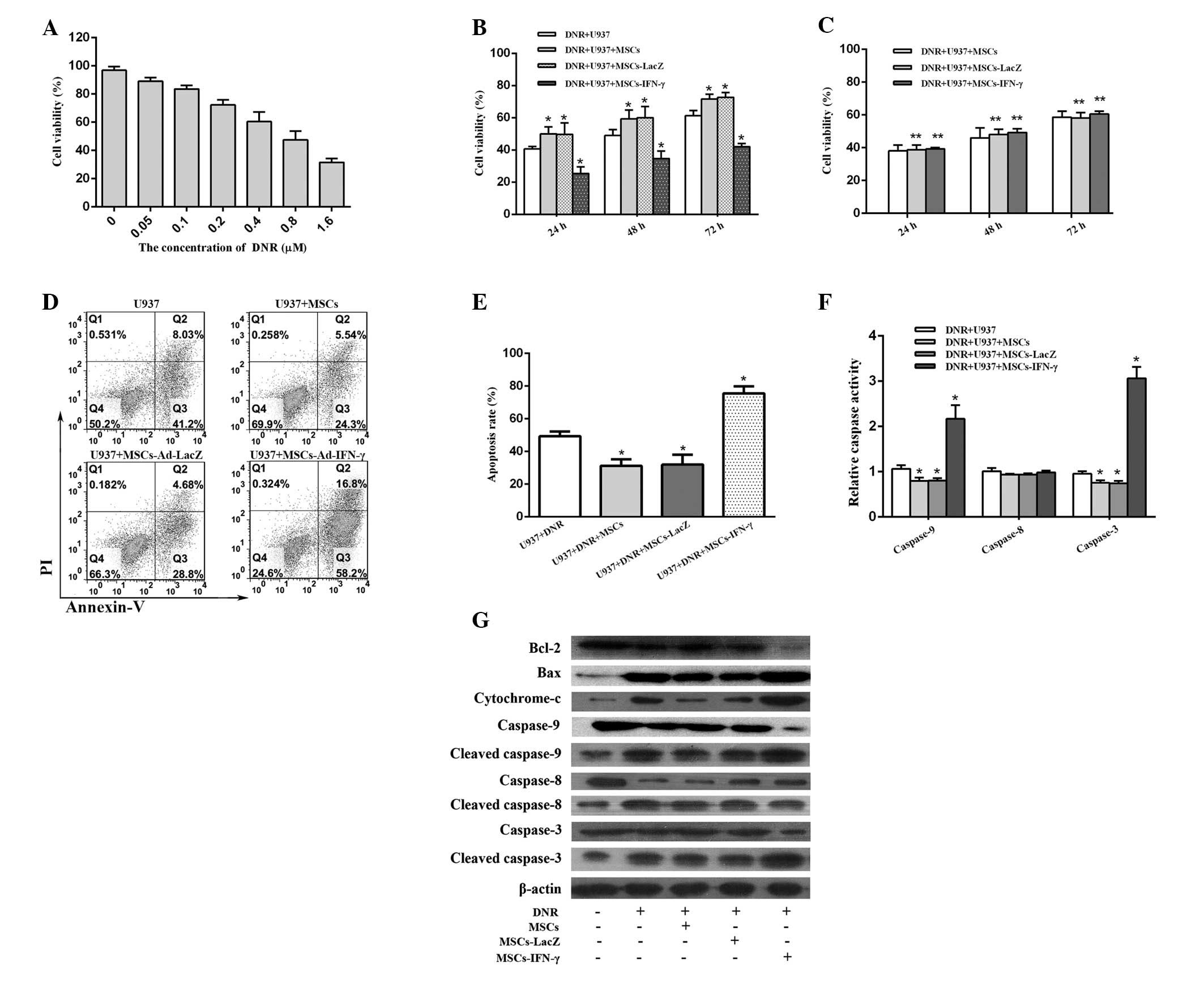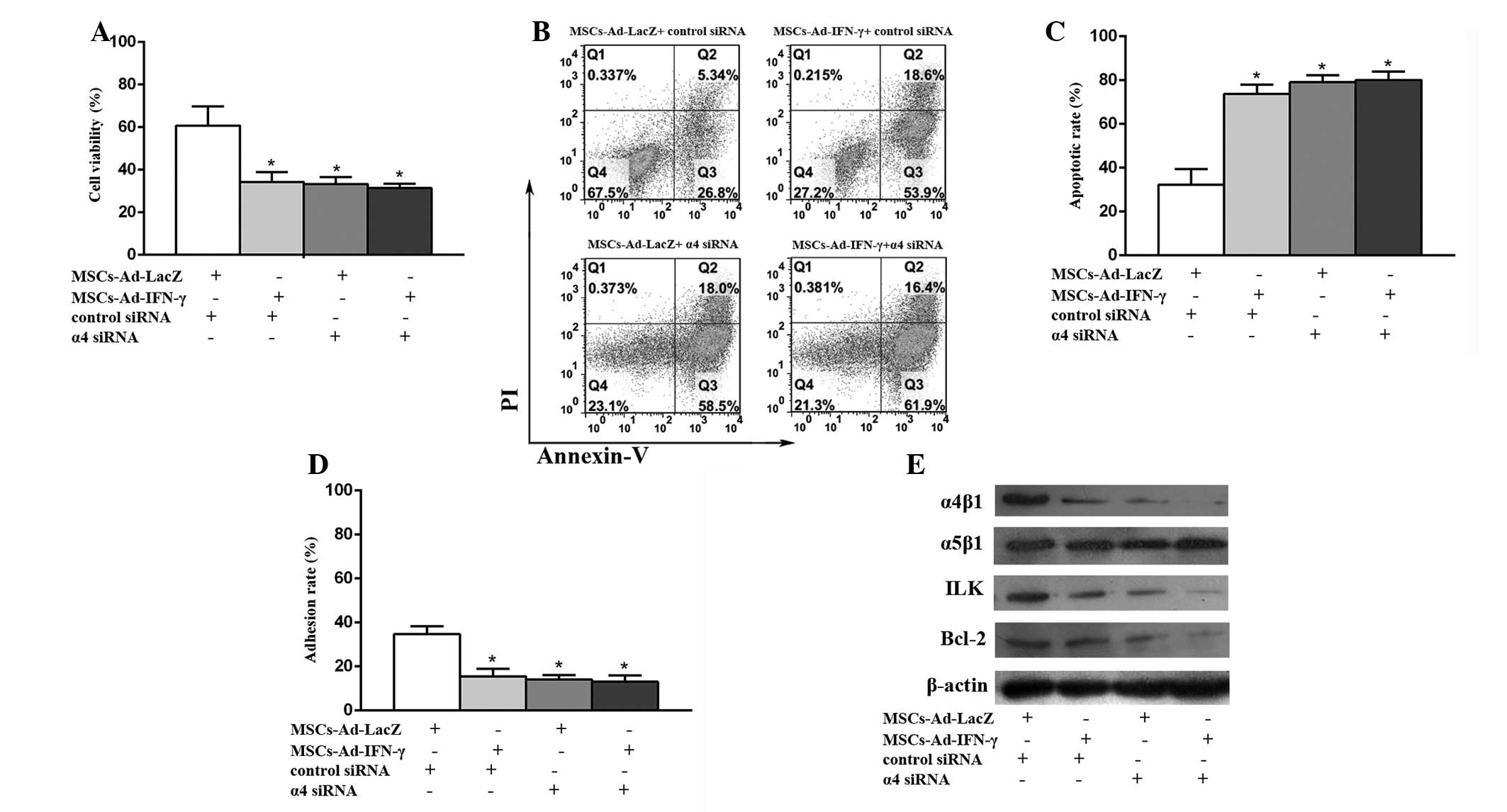|
1
|
Tallman MS, Gilliland DG and Rowe JM: Drug
therapy for acute myeloid leukemia. Blood. 106:1154–1163. 2005.
View Article : Google Scholar : PubMed/NCBI
|
|
2
|
Miller CH, Maher SG and Young HA: Clinical
use of interferon-gamma. Ann N Y Acad Sci. 1182:69–79. 2009.
View Article : Google Scholar : PubMed/NCBI
|
|
3
|
Dummer R, Hassel JC, Fellenberg F, et al:
Adenovirus-mediated intralesional interferon-gamma gene transfer
induces tumor regressions in cutaneous lymphomas. Blood.
104:1631–1638. 2004. View Article : Google Scholar
|
|
4
|
Khorana AA, Rosenblatt JD, Sahasrabudhe
DM, et al: A phase I trial of immunotherapy with intratumoral
adenovirus-interferon-gamma (TG1041) in patients with malignant
melanoma. Cancer Gene Ther. 10:251–259. 2003. View Article : Google Scholar : PubMed/NCBI
|
|
5
|
Li X, Lu Y, Huang W, et al: In vitro
effect of adenovirus-mediated human Gamma Interferon gene transfer
into human mesenchymal stem cells for chronic myelogenous leukemia.
Hematol Oncol. 24:151–158. 2006. View
Article : Google Scholar : PubMed/NCBI
|
|
6
|
Damiano JS, Hazlehurst LA and Dalton WS:
Cell adhesion-mediated drug resistance (CAM-DR) protects the K562
chronic myelogenous leukemia cell line from apoptosis induced by
BCR/ABL inhibition, cytotoxic drugs, and gamma-irradiation.
Leukemia. 15:1232–1239. 2001. View Article : Google Scholar
|
|
7
|
Delcommenne M, Tan C, Gray V, Rue L,
Woodgett J and Dedhar S: Phosphoinositide-3-OH kinase-dependent
regulation of glycogen synthase kinase 3 and protein kinase B/AKT
by the integrin-linked kinase. Proc Natl Acad Sci USA.
95:11211–11216. 1998. View Article : Google Scholar : PubMed/NCBI
|
|
8
|
Hannigan GE, Leung-Hagesteijn C,
Fitz-Gibbon L, et al: Regulation of cell adhesion and
anchorage-dependent growth by a new beta 1-integrin-linked protein
kinase. Nature. 379:91–96. 1996. View
Article : Google Scholar
|
|
9
|
Persad S, Attwell S, Gray V, et al:
Regulation of protein kinase B/Akt-serine 473 phosphorylation by
integrin-linked kinase: critical roles for kinase activity and
amino acids arginine 211 and serine 343. J Biol Chem.
276:27462–27469. 2001. View Article : Google Scholar
|
|
10
|
Tabe Y, Jin L, Tsutsumi-Ishii Y, et al:
Activation of integrin-linked kinase is a critical prosurvival
pathway induced in leukemic cells by bone marrow-derived stromal
cells. Cancer Res. 67:684–694. 2007. View Article : Google Scholar
|
|
11
|
Takaki T, Kobayashi M, Okubo K, et al:
Interferon-gamma inhibits collagen phagocytosis in human
fibroblasts by inducing subcortical actin assembly and reducing
ability of beta1 integrin to bind to collagen. Inflamm Res.
55:534–542. 2006. View Article : Google Scholar
|
|
12
|
Studeny M, Marini FC, Champlin RE,
Zompetta C, Fidler IJ and Andreeff M: Bone marrow-derived
mesenchymal stem cells as vehicles for interferon-beta delivery
into tumors. Cancer Res. 62:3603–3608. 2002.PubMed/NCBI
|
|
13
|
Wei Z, Chen N, Guo H, et al: Bone marrow
mesenchymal stem cells from leukemia patients inhibit growth and
apoptosis in serum-deprived K562 cells. J Exp Clin Cancer Res.
28:1412009. View Article : Google Scholar
|
|
14
|
Mizuguchi H and Kay MA: Efficient
construction of a recombinant adenovirus vector by an improved in
vitro ligation method. Hum Gene Ther. 9:2577–2583. 1998. View Article : Google Scholar : PubMed/NCBI
|
|
15
|
Zhao P, Zhu YH, Wu JX, et al:
Adenovirus-mediated delivery of human IFNgamma gene inhibits
prostate cancer growth. Life Sci. 81:695–701. 2007. View Article : Google Scholar : PubMed/NCBI
|
|
16
|
Wang H, Geng QR, Wang L and Lu Y: Curcumin
potentiates antitumor activity of l-asparaginase via inhibition of
the AKT signaling pathway in acute lymphoblastic leukemia. Leuk
Lymphoma. 53:1376–1382. 2012. View Article : Google Scholar : PubMed/NCBI
|
|
17
|
Cao YD, Huang PL, Sun XC, et al: Silencing
of high mobility group A1 enhances gemcitabine chemosensitivity of
lung adenocarcinoma cells. Chin Med J (Engl). 124:1061–1068.
2011.PubMed/NCBI
|
|
18
|
Guo-Bao W, Xiao-Qin C, Qi-Rong G, Jie L,
Gui-Nan L and Yue L: Arsenic Trioxide overcomes cell
adhesion-mediated drug resistance through down-regulating the
expression of beta(1)-integrin in K562 chronic myelogenous leukemia
cell line. Leuk Lymphoma. 51:1090–1097. 2010. View Article : Google Scholar
|
|
19
|
Beauvais G, Atwell K, Jayanthi S,
Ladenheim B and Cadet JL: Involvement of dopamine receptors in
binge methamphetamine-induced activation of endoplasmic reticulum
and mitochondrial stress pathways. PLoS One. 6:e289462011.
View Article : Google Scholar
|
|
20
|
Garrido SM, Appelbaum FR, Willman CL and
Banker DE: Acute myeloid leukemia cells are protected from
spontaneous and drug-induced apoptosis by direct contact with a
human bone marrow stromal cell line (HS-5). Exp Hematol.
29:448–457. 2001. View Article : Google Scholar
|
|
21
|
Hazlehurst LA, Valkov N, Wisner L, et al:
Reduction in drug-induced DNA double-strand breaks associated with
beta1 integrin-mediated adhesion correlates with drug resistance in
U937 cells. Blood. 98:1897–1903. 2001. View Article : Google Scholar
|
|
22
|
Matsunaga T, Takemoto N, Sato T, et al:
Interaction between leukemic-cell VLA-4 and stromal fibronectin is
a decisive factor for minimal residual disease of acute myelogenous
leukemia. Nat Med. 9:1158–1165. 2003. View
Article : Google Scholar
|
|
23
|
Dominici M, Le Blanc K, Mueller I, et al:
Minimal criteria for defining multipotent mesenchymal stromal
cells. The International Society for Cellular Therapy position
statement. Cytotherapy. 8:315–317. 2006. View Article : Google Scholar
|
|
24
|
Estey E and Döhner H: Acute myeloid
leukaemia. Lancet. 368:1894–1907. 2006. View Article : Google Scholar
|
|
25
|
Loebinger MR, Eddaoudi A, Davies D and
Janes SM: Mesenchymal stem cell delivery of TRAIL can eliminate
metastatic cancer. Cancer Res. 69:4134–4142. 2009. View Article : Google Scholar : PubMed/NCBI
|
|
26
|
Ren C, Kumar S, Chanda D, Chen J, Mountz
JD and Ponnazhagan S: Therapeutic potential of mesenchymal stem
cells producing interferon-alpha in a mouse melanoma lung
metastasis model. Stem Cells. 26:2332–2338. 2008. View Article : Google Scholar : PubMed/NCBI
|
|
27
|
Hynes RO: Integrins: bidirectional,
allosteric signaling machines. Cell. 110:673–687. 2002. View Article : Google Scholar : PubMed/NCBI
|
|
28
|
De Toni-Costes F, Despeaux M, Bertrand J,
et al: A New alpha5beta1 integrin-dependent survival pathway
through GSK3beta activation in leukemic cells. PLoS One.
5:e98072010.PubMed/NCBI
|



















